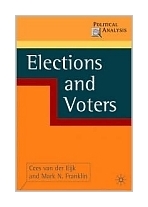|
||
• wydawnictwa polskie
• Zamów informacje o nowościach z wybranego tematu • kontakt
• Cookies na stronie |
ELECTIONS AND VOTERSCEES VAN DER EIJK GUY PETERS MARK FRANKLINwydawnictwo: PALGRAVE MACMILLAN , rok wydania 2009, wydanie Icena netto: This major new text by two leading authorities in the field provides a state-of-the-art assessment of what we know about voting behavior and the character, consequences and significance of elections in democratic states. Uniquely broad-ranging in scope, it shows how patterns of electoral behavior have evolved over time and also assesses the varying extents to which voters in different countries are able to affect the direction of government policies in practice. Table of Contents
List of Figures, Tables and Boxes viii Preface and Acknowledgements xi 1 Why Elections? 1 Political parties 1 Functions of elections 4 The turnout paradox 6 Limitations of elections 7 Recurring themes 10 Voters, electorates, parties and party systems 12 The axis of political competition and the median voter 13 Representation 14 Electoral change 15 Topics 18 Countries 21 Institutional arrangements 21 Voters and the puzzle of the ignorant electorate 24 Plan of the book 25 2 Studying Elections, Parties and Voters 27 The political context: party systems 27 The Institutional context 29 Problems of parliamentary government 34 Problems of presidential systems 38 Government formation 39 How elections condition coalition bargaining 41 Institutional influences on the structure of political life 44 Habits and routines 46 Socialization, immunization and party identification 49 Preferences and choice 53 Institutional change 56 3 Electoral Institutions 58 Free and fair elections 58 votes and outcomes 59 Electoral rules 63 Trade-offs designing an electoral system 69 Electoral reform 71 Rules of the game for government formation 74 The role of the voters 78 The majoritarian and proportional visions 81 Dispersed versus concentrated power 83 Presidents and monarchs in parliamentary systems 84 4 Voters and Parties 87 Party immunization and generational differences 89 Group loyalties 92 The decline of cleavage politics 95 The rise of issue voting 98 Long-term changes in electoral competition 101 Strategic considerations 103 The role of the Prime Minister in parliamentary regimes 108 Tactical voting109 Candidate evaluations 113 Implications 114 5 Outcomes of Elections 118 Consequences of electoral shifts 119 Incumbency and terms limits 121 Accountability 123 Fairness in election outcomes 125 Trade-offs between proportional and majoritarian systems 127 Bias in election outcomes 129 Turnout and bias 130 Protest voting 131 The structuring effects of strategic considerations 136 Split-ticket voting, 'balance' and mid-term loss 138 Consequences of party positions 140 Leadership 143 Learning from elections 144 6 The Role of Public Opinion 146 Ways of studying public pinion 146 Why do people hold the opinions that they do? 147 The puzzle of the ignorant electorate 154 From issues to issue spaces 157 The issue space and proximity (smallest distance) theory 161 Party competence and issue ownership 166 The directional theory of party support 168 The responsiveness of public opinion 170 The swing of the pendulum 174 A sophisticated electorate? 177 7 Voter Orientations 179 The decline of partnership 179 Generational replacement and electoral change 182 Political change and political realignments 183 The hands of the past 187 The dynamics of generational replacement 189 Events and economic news 194 Studying party preferences 194 What accounts for preferences? 199 Mandates versus accountability (prospective versus retrospective voting) 207 Effects on preferences in newly established and consolidating democracies 208 8 Assessing Electoral Democracy 213 Representing citizens'; preferences 213 Do elections matter? 220 What we have learned 222 The quality of electoral processes 223 Evaluating the institutional arrangements for electoral democracy 228 What role for electoral democracy? 232 Possibilities for reform 234 A work in progress 239 Appendix: Use of Statistical Analysis 240 Notes 247 Guide to Further Reading 252 Bibliography 265 Author Index 292 Subject Index 298 256 pages, Paperback Księgarnia nie działa. Nie odpowiadamy na pytania i nie realizujemy zamówien. Do odwolania !. |


